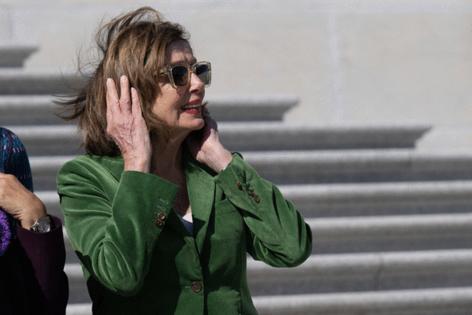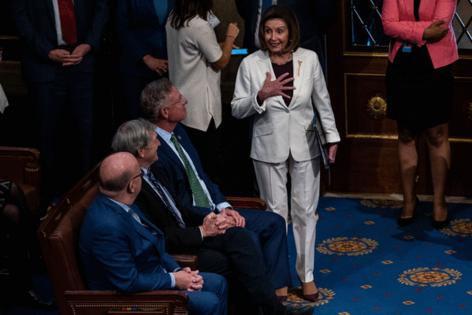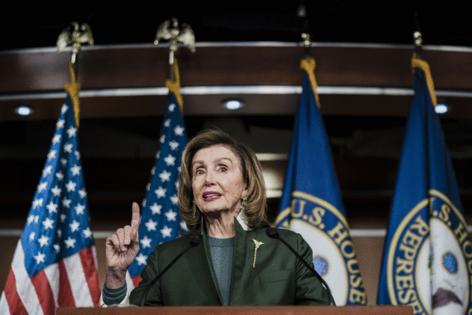Pelosi announces retirement as history-making career comes to a close
Published in Political News
WASHINGTON — Nancy Pelosi, the California Democrat who scaled the leadership ladder to become the first female speaker of the House, will not seek a 21st term next year, she announced in a video message Thursday.
“I want you, my fellow San Franciscans, to be the first to know: I will not be seeking reelection to Congress. With a grateful heart, I look forward to my final year of service as your proud representative,” Pelosi said in the video.
Pelosi’s decision puts an end date on a four-decadeslong electoral career that began when she won a 1987 House special election to her San Francisco-based district in her first run for public office.
Her fingerprints are on almost every major piece of legislation Democrats have championed this century, including the Affordable Care Act and tougher regulations in the aftermath of the 2008 financial crisis. She also played a key role in the passage of President Joe Biden’s legislative priorities, including the bipartisan infrastructure bill.
“She’s the most consequential woman politician in U.S. history, in terms of her accomplishments,” said Eric Schickler, a political science professor at the University of California, Berkeley. “She was trusted by progressives, because they knew her values were progressive, but she also could understand the needs of the moderates and have their trust as well, and that allowed her to make deals.”
Democrats were effusive in their praise for the former speaker. California Gov. Gavin Newsom, a native San Franciscan, said Pelosi “inspired generations and ... has set the standard for what public service should be.”
U.S. Sen. Adam B. Schiff of California, a former longtime House colleague, said Pelosi’s “tenacity, intellect, strategic acumen and fierce advocacy” made her “the greatest speaker in American history.”
Even Pelosi’s adversaries expressed admiration for her formidable political skills.
“I served under her speakership in my first term in Congress, and I’m very impressed at her ability to get things done,’’ Rep. Marjorie Taylor Greene, a Republican firebrand from Georgia, said on CNN. “I wish we could get things done for our party like Nancy Pelosi was able to deliver for her party.”
Even before the 85-year-old Pelosi announced her retirement, two Democrats pressing for generational change within the party had filed to run for her 11th District seat. State Sen. Scott Wiener, who has advocated an overhaul to housing laws to spur new construction, entered the Democratic primary late last month, joining progressive Saikat Chakrabarti, a former chief of staff to Rep. Alexandria Ocasio-Cortez, D-N.Y.
Politico reported last month that several other candidates are weighing a run, including Christine Pelosi, the former speaker’s daughter; San Francisco Supervisor Connie Chan; and Jane Kim, a former city supervisor and director of the left-wing California Working Families Party.
Asked Thursday about Pelosi’s retirement, Speaker Mike Johnson said, “We commend her for her services. We all do, everyone who serves in Congress.” But, he added, he saw Pelosi’s departure as a sign the Democratic base has become so progressive that “even the famous San Francisco liberal is not far-left enough for the neo-Marxists.”
Over two decades as House Democratic leader, Pelosi blended a liberal policy platform with hard-nosed political realism. She was hailed as a skilled negotiator and master tactician who could whip votes, make deals and corral recalcitrant members of the caucus to win support for her agenda.
She played a pivotal role leading the Democrats against President Donald Trump during his first term. In one televised bit of drama, Pelosi, seated on the dais behind Trump, tore up her copy of his 2020 State of the Union address, moments after he delivered it to Congress.
Pelosi first joined House Democratic leadership in 2001, with her election as minority whip over Rep. Steny H. Hoyer of Maryland. The following year, she was elected minority leader, becoming the first woman to lead a party caucus. In 2007, she was elected the first female speaker after Democrats won control of Congress and went to serve in the role for four years. After Democrats flipped control of the House in 2018, Pelosi held the speaker’s gavel for another four-year stint.
After her speakership ended and she handed party leadership to Rep. Hakeem Jeffries of New York — her hand-picked successor — Pelosi remained one of Washington’s key power brokers.
From a perch behind the scenes, she wielded pressure on Biden to give up on his run for a second term following his disastrous debate performance against Trump last year.
And Pelosi’s retirement announcement came just days after notching what could become one of her last significant political wins: helping usher over the finish line a California ballot initiative to offset Republican-led redistricting efforts elsewhere.
©2025 CQ-Roll Call, Inc., All Rights Reserved. Visit cqrollcall.com. Distributed by Tribune Content Agency, LLC.





























































Comments